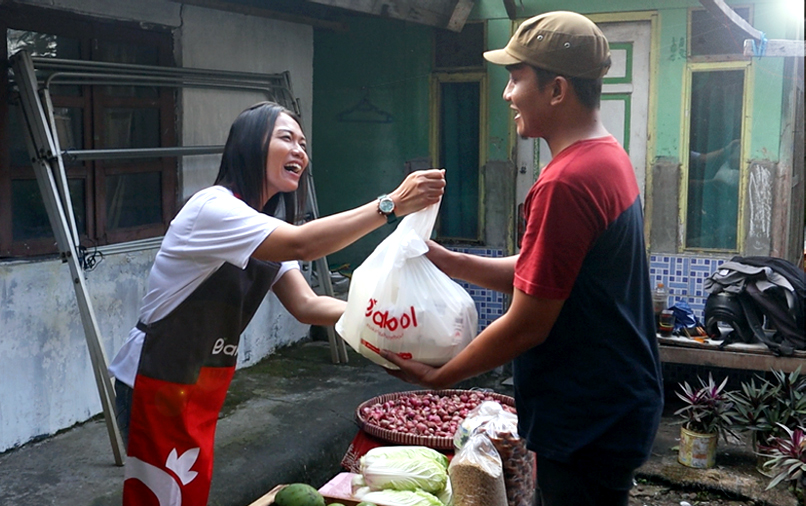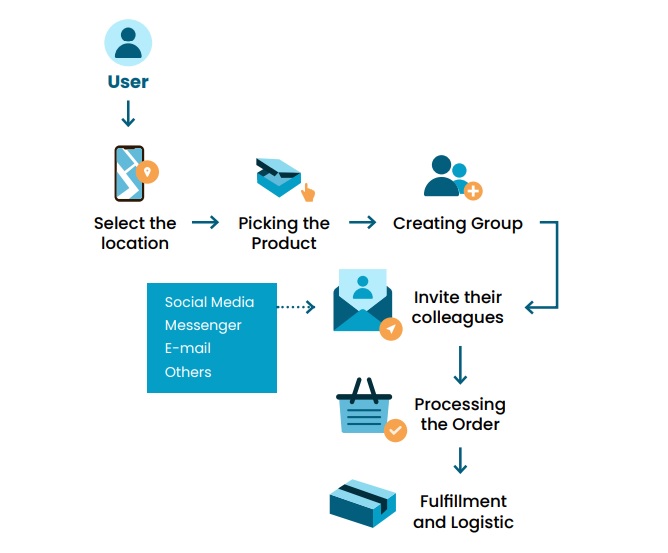Quick Commerce Startup "Radius" Pivot Becomes Social Commerce
Announcing seed funding from Kleiner Perkins, Goodwater, Insignia Ventures, Global Brain, to Mari Elka Pangestu
Startups quick commerce Radius announced pivot business to social commerce and rebranding to be Bakol. The decision was taken because the company did not find economic units as a prospective step in pursuing sustainability, considering that this business is capital intensive in operations.
In a joint interview DailySocial.id, Co-Founder and CEO of Bakool Ivan Darmawan explained that for several months running Radius, it was found that as much as 80% of the transactions came from fresh goods rather than dry groceries (dry goods) others.
"Radius includes discipline in running a business, without excessive promos, overhire, etc. It's just that, we see to meet the expectations of willing investors growth tight in the future it will be difficult to maintain growth positive because if expansion requires opening a new store. So it is necessary to pivot," he said, Monday (19/12).
Radius introduced themselves publicly in early 2022. They position themselves as quick commerce which sells daily necessities, ranging from basic necessities, instant and light food, household, cosmetics and personal care, milk and processed products, drinks, as well as children's needs. This solution is offered to people who live in second and third tier cities, who need digital solutions evenly distributed and so far it has been concentrated in Jakarta only.
According to Ivan, the fresh product was only recently introduced at Radius, but in two months the transactions reached thousands, able to compete with the non-fresh category. When investigated more deeply, it turns out that meeting the need for fresh ingredients in second-tier cities has been a chronic problem. Because to get fresh and cheap products, people have to wake up early in the morning to shop at the market.
Bacool It was introduced five months ago, after a two-month pilot project. The concept is the same as what ChiliBeli is now WeBuy post-acquisition in March 2022. Apart from Ivan, Radius Co-Founder Stephanie Wongsoredjo also joined Bakool.

Bakool business model
Bakool is a group purchasing platform (group buying) for fresh products targeting cities that have a Gross Domestic Product (GDP) lower than $7.500 or around IDR 117 million per year. In these cities, most fresh produce is still accessed through traditional wet markets. These cities also have 50% lower incomes, but pay the same prices for goods of the same quality as Jakarta.
"The UMR outside Jakarta is far apart, but the prices for shopping for kitchen necessities are similar. So they are like that purchasing powerIt's small, but there are definitely transactions every day. Because behavior like this, a lot provider that no want to serve because no closing [its operations]. But we saw that there was an opportunity here and we wanted to resolve. Hence, we entered with group buying."
By working using a network-based model business-to-agent-to-consumer (B2A2C), Bakool enables the purchase and delivery of fresh produce for tier two city households, thereby increasing household productivity. These households can save up to 15% on goods and transportation costs, and save up to five hours a day because they no longer need to go to the night market.
Bakool agents also benefit, by making fresh produce more accessible and convenient for their communities, these agents, who are usually housewives and community leaders, are able to generate up to three times their income.
From an operational perspective, it is much more efficient, from the start to achieve the delivery target in a matter of minutes you need to get up hubs small, now you only need to build one hub in each province. "The control at Bakool is very different, we will invest a lot here because we are already strong in delivery."
All supplies of fresh products in Bakool will be provided by farmers and collectors who partner directly with the company. Bakool seeks to cut inefficiencies supply chain leaders which resulted in soaring selling prices for final consumers, even increasing by up to 700%. Through thousands of Bakool agents who are still concentrated in Semarang and surrounding areas, the company can reduce transportation and supply costs, without sacrificing quality.
"Our vision is different compared to the players e-grocery or agritech others who want to equalize food prices, cut middlemen, and help farmers. We want to increase people's productivity by group buying, mothers who become agents can earn additional income."
In the long term, the company wants to become a company that supplies fresh food to rural Indonesia without having to own or build offline stores.
Menurut report DSInnovate, group buying become a business model social commerce which is starting to become popular in Indonesia. Besides Echo, currently there are a number of startups also playing in this area, for example Grupin, Kitabeli, CrediMart, and Mapan.

Potency social commerce in Indonesia is also quite large, it is estimated that this year the market capitalization of the business will reach $8,6 billion. Projected to grow at a CAGR of 47,9% to generate a value of $86,7 billion in 2028. Concept social commerce can also bridge gap those in second and third tier cities, as a user base that has not yet been fully optimized by players E-commerce previous.
Receive early stage funding
At the same time, Bakool announced the initial stage of funding with an undisclosed amount. Investors participating in this round include Kleiner Perkins, Goodwater, Insignia Ventures, Global Brain, former Minister of Trade Mari Elka Pangestu, and others.
In an official statement, Mari stated that Bakool's mission to increase household productivity is a focus that is really needed by technology businesses in the country. This mission will have a long-term impact on the national economy and has the potential impact on future generations to have a better quality of life.
"I look forward to the progress Ivan, Stephanie and their team will make to make this impact a reality for underserved cities and economies across Indonesia," said Mari.
Furthermore, Founding Managing Partner of Insignia Ventures Yinglan Tan added, Bakool is taking advantage of large unserved opportunities regarding the accessibility of fresh products for tier 2, 3 and rural cities in Indonesia, which has become a significant business and has even captured part of the market.
Ivan and Stephanie have over 15 years of experience in retail, agriculture and supply chain, leadership experience in unicorn, and significant progress and learning to grow Radius.
"We believe they are in a prime position to evolve in this role to improve, not only the way Indonesians in these cities access fresh produce, but also impact overall household productivity in the country, with group purchasing cost savings, time savings delivery, and revenue for their agents." Close Tan.
Sign up for our
newsletter
 Premium
Premium
